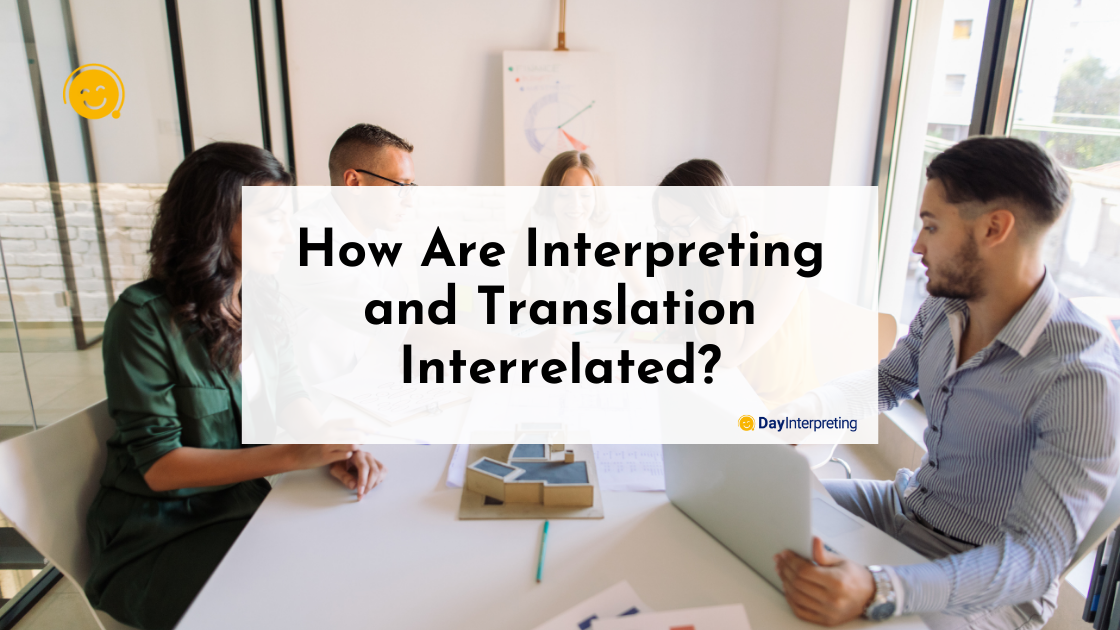Ask a few random people what they think the difference between a translator and an interpreter is. 90% of them will probably say that there’s no difference. But that’s the general public’s opinion. A linguist will have a different take on this and will be able to tell you how interpreting and translation are interrelated yet very different.
Interpreting and translation are two closely related fields of discipline within the language services industry. But they’re rarely done by the same people. Translators have a different set of skills, training, and language knowledge than interpreters.
Sure, on the surface, it might appear as though these professions are basically one and the same. But translators work with the written word. Interpreters, on the other hand, work with the spoken word. What they do have in common, at first glance, is translating from a source language to a target language.
In today’s post, we’ll dig a little deeper into the similarities and differences between translation and interpretation. We’ll also focus on how interpreting and translation are interrelated.
How Are Interpreting and Translation Related?
Translators and interpreters both work as language intermediaries. They both convert words from a source language to a target language. So, in short, they both bridge the language gap between people that do not speak the same language.
These two jobs are also specialized, and not everyone can be an interpreter or translator. These professionals undergo hours and hours of training and build up years of experience before they can shine in their roles. They need linguistic qualifications and certificates as well as a deep knowledge of languages and cultures.
Not all Languages Have a Direct Correlation from Translation to Interpretation
The fact is, when looking in the language industry, many languages do not directly link translating and interpretation. While some spoken languages lack written equivalents, such as American Sign Language and a number of indigenous American languages, other dialects share the same writing language. Often Chinese people refer to it either in terms of spoken languages or written languages. However, there are more than 200 different spoken language languages (most commonly Mandarin / Chinese Cantonese).
Interpretation vs. Translation Services
There are major differences among interpreters and translators depending on their medium and skill set. Translators translate content and written texts. Interpreters facilitate real-life conversations that involve different languages. Both require deep cultural and language knowledge, expert knowledge of topics, and communications skills. While these phrases have been frequently used interchangeably, it is essential to understand the differences in these closely connected languages for the right choice of service.
What Are the Differences Between Translation and Interpreting?
Let’s break this down into three sections to make it easier to understand the differences:
#1 – Skills Required for Translations and Simultaneous Interpreting
Translators work with written documents, so they naturally need excellent writing skills. Translators also need to have expert research skills along with the ability to work with CAT tools to help them complete their projects quicker and more effectively. They must research the topics to effectively translate to the target language while keeping other culturally specific references in mind.
Interpreters, on the other hand, need great listening skills. They also have excellent public speaking abilities. But more than that, they have quick decision-making skills to accurately translate the message as soon as it is spoken.
#2 – Accuracy of the Written and Spoken Word
Professional translators typically work with tools that help them improve their accuracy levels. Translators get a set amount of time to translate and review their written language projects. They also have editors, dictionaries, and proofreaders on hand to ensure that their accuracy is spot on with every project.
However, interpreters don’t have to translate a communication word-for-word. They’re free to paraphrase the words as long as they keep the core meaning intact. Naturally, they do need to prepare for the conference or meeting ahead to ensure the accuracy of their interpretation.
#3 – One-or-Two-Way Translation for Source Language and Target Language
Qualified translators are natives of the target languages they work with. So, when they translate a document from English to Chinese, for example, native Chinese translators are the preferred choice. But there’s no vice versa.
Interpreters, in contrast, must translate back and forth for at least two languages. If the interpreter translates a message from a patient to a doctor from Chinese to English, he has to translate it back from English to Chinese.
Get Help from Professional Interpreters and Translators
Translators and interpreters have excellent linguistic and cultural skills. Both types of professionals work in the language services industry and deliver accurate translation and interpreting services by converting the original meaning of a message into a foreign language.
It is safe to say that both interpretation and translation complement each other, as both the translator and interpreter share certain characteristics and abilities such as subject matter expertise. They help them in presenting texts in different languages and providing them with the cultural nuances they deserve.
In closing, there’s one last thing we cannot omit. We should also note that both the interpretation and translation industries share an appreciation and deep love for languages.
Day Interpreting, is a sister company of Day Translations, is a leader in the translation and interpretation sector. Our network of experienced and professional language experts is based all over the world. Get in touch with us today to find out how we can help you overcome the language barrier!





0 Comments